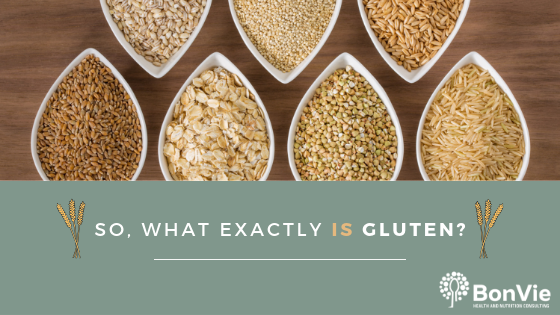
18 Jul So What Exactly Is Gluten?!
Gluten describes a group of proteins found in 3 major cereal grains: wheat, rye, and barley. Think of gluten as the binder which holds wheat, rye, and barley containing foods together to hold their shape. It affects the elasticity of dough and therefore the chewiness of the final product. If you have ever had gluten-free bread that tasted like cardboard, now you know why!

Of course the big important question I get asked all of the time: Is gluten bad for you? The short answer is that inherently it’s not. However, if you have a gluten sensitivity, gluten intolerance, or autoimmune disease (like celiac disease), then gluten can lead to more serious health problems and cause you a lot of distress that can manifest in your body in different ways (your GI system, your skin, headaches, etc).
The reason many people suffer from sensitivities and intolerances to gluten is because their bodies have abnormal immune responses to gluten proteins. For instance, those who have celiac disease cannot eat gluten due to an immune response that is triggered upon ingesting gluten. This can lead to malnutrition from poor nutrient absorption, damage to the colon, stunted growth, and other serious health problems.
For those without sensitivities and intolerances, gluten-containing foods provide many vitamins, minerals, fiber, and other nutrients! Don’t eliminate whole grains from your diet if you don’t have a sensitivity to gluten — they have lots of wonderful health benefits!
However, if you notice a pattern of stomach upset, rashes, or headaches that you didn’t notice before, consider cutting out gluten for a bit and see if you have any positive changes. Of course, you can also speak to your doctor about getting tested if that’s the case.

Any specific questions about gluten? Let me know! As someone who has celiac disease myself, I’m always here for some gluten-free tips!


No Comments